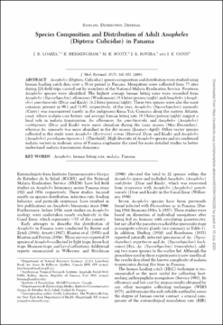Mostrar el registro sencillo del ítem
Species Composition and Distribution of Adult Anopheles (Diptera: Culicidae) in Panama
| dc.contributor.author | LOAIZA, J. R. | |
| dc.contributor.author | BERMINGHAM, E. | |
| dc.contributor.author | SCOTT, M. E. | |
| dc.contributor.author | ROVIRA, J. R. | |
| dc.contributor.author | CONN, J. E. | |
| dc.date.accessioned | 2020-07-10T05:13:50Z | |
| dc.date.available | 2020-07-10T05:13:50Z | |
| dc.date.issued | 2008-09-01 | |
| dc.identifier.other | https://doi.org/10.1093/jmedent/45.5.841 | |
| dc.identifier.uri | http://repositorio-indicasat.org.pa/handle/123456789/202 | |
| dc.description | Anopheles (Diptera: Culicidae) species composition and distribution were studied using human landing catch data over a 35-yr period in Panama. Mosquitoes were collected from 77 sites during 228 Þeld trips carried out by members of the National Malaria Eradication Service. Fourteen Anopheles species were identiÞed. The highest average human biting rates were recorded from Anopheles (Nyssorhynchus) albimanus (Wiedemann) (9.8 bites/person/night) andAnopheles (Anopheles) punctimacula (Dyar and Knab) (6.2 bites/person/night). These two species were also the most common, present in 99.1 and 74.9%, respectively, of the sites. Anopheles (Nyssorhynchus) aquasalis (Curry) was encountered mostly in the indigenous Kuna Yala Comarca along the eastern Atlantic coast, where malaria case history and average human biting rate (9.3 bites/person/night) suggest a local role in malaria transmission. An. albimanus, An. punctimacula, and Anopheles (Anopheles) vestitipennis (Dyar and Knab) were more abundant during the rainy season (MayÐDecember), whereas An. aquasalis was more abundant in the dry season (JanuaryÐApril). Other vector species collected in this study were Anopheles (Kerteszia) neivai (Howard, Dyar, and Knab) and Anopheles (Anopheles) pseudopunctipenniss.l. (Theobald). High diversity of Anophelesspecies and six conÞrmed malaria vectors in endemic areas of Panama emphasize the need for more detailed studies to better understand malaria transmission dynamics. | en_US |
| dc.description.abstract | Anopheles (Diptera: Culicidae) species composition and distribution were studied using human landing catch data over a 35-yr period in Panama. Mosquitoes were collected from 77 sites during 228 Þeld trips carried out by members of the National Malaria Eradication Service. Fourteen Anopheles species were identiÞed. The highest average human biting rates were recorded from Anopheles (Nyssorhynchus) albimanus (Wiedemann) (9.8 bites/person/night) andAnopheles (Anopheles) punctimacula (Dyar and Knab) (6.2 bites/person/night). These two species were also the most common, present in 99.1 and 74.9%, respectively, of the sites. Anopheles (Nyssorhynchus) aquasalis (Curry) was encountered mostly in the indigenous Kuna Yala Comarca along the eastern Atlantic coast, where malaria case history and average human biting rate (9.3 bites/person/night) suggest a local role in malaria transmission. An. albimanus, An. punctimacula, and Anopheles (Anopheles) vestitipennis (Dyar and Knab) were more abundant during the rainy season (MayÐDecember), whereas An. aquasalis was more abundant in the dry season (JanuaryÐApril). Other vector species collected in this study were Anopheles (Kerteszia) neivai (Howard, Dyar, and Knab) and Anopheles (Anopheles) pseudopunctipenniss.l. (Theobald). High diversity of Anophelesspecies and six conÞrmed malaria vectors in endemic areas of Panama emphasize the need for more detailed studies to better understand malaria transmission dynamics. | en_US |
| dc.language.iso | eng | en_US |
| dc.rights | info:eu-repo/semantics/openAccess | |
| dc.rights | https://creativecommons.org/licenses/by-nc-sa/4.0/ | |
| dc.subject | Anopheles | en_US |
| dc.subject | human biting rate | en_US |
| dc.subject | malaria | en_US |
| dc.subject | Panama | en_US |
| dc.title | Species Composition and Distribution of Adult Anopheles (Diptera: Culicidae) in Panama | en_US |
| dc.type | info:eu-repo/semantics/article | en_US |
| dc.type | info:eu-repo/semantics/publishedVersion |

